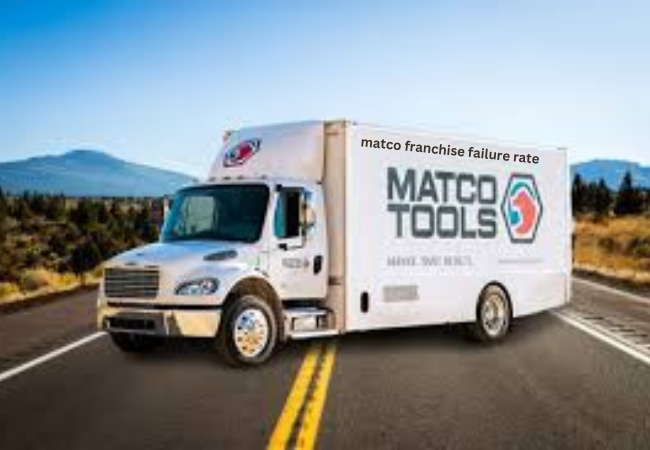Unveiling the Realities: Matco Franchise Failure Rate

Understanding Franchise Failure Rates
Franchise failure rates refer to the percentage of franchises that cease operations within a specific period. Understanding these rates is crucial for potential franchisees to gauge the risks involved. Factors such as market conditions, management effectiveness, and brand strength play significant roles in determining these rates.
The matco franchise failure rate Franchise Business Model
The matco franchise failure rate operates on a mobile store model, where franchisees sell tools directly to customers from a custom-built truck. The initial investment ranges from $88,000 to $150,000, including the franchise fee, truck, inventory, and working capital. Revenue streams include direct sales, financing options for customers, and repeat business from loyal customers.
Historical Performance of Matco Franchisees
Historically, Matco franchisees have reported mixed results. While many have found success, achieving financial stability and growth, others have faced significant challenges. Success stories often highlight the benefits of comprehensive training and robust support from Matco’s corporate team.
Common Challenges Faced by Matco Franchisees
Franchisees often encounter market competition, operational difficulties, and financial pressures. Competition from other tool brands and the challenge of maintaining a consistent customer base are common issues. Additionally, managing inventory, ensuring timely delivery, and balancing finances can be daunting.
Financial Investment and Return Expectations
The initial investment in a Matco franchise includes the franchise fee, truck lease or purchase, inventory, and working capital. Ongoing costs encompass inventory replenishment, vehicle maintenance, and marketing expenses. Expected ROI varies, with some franchisees reporting profitable operations within the first few years, while others struggle to break even.
Training and Support Provided by Matco
Matco offers extensive training programs for new franchisees, covering product knowledge, sales techniques, and business management. Ongoing support includes regular field visits, marketing assistance, and a dedicated support hotline. Mentorship programs pair new franchisees with experienced ones, fostering knowledge sharing and support.
Market Demand for Tools and Equipment
The automotive tools and equipment market is robust, driven by the need for vehicle maintenance and repair. Growth projections indicate steady demand, particularly in regions with high vehicle ownership. This demand underpins the potential success of Matco franchisees.
Comparing Matco with Other Tool Franchises
Matco stands out due to its comprehensive support system and high-quality product range. Compared to competitors like Snap-on and Mac Tools, Matco offers a more flexible entry point and robust franchisee support. However, each brand has its unique strengths and market positioning.
Case Studies: Success and Failure Stories
Examining case studies provides valuable insights into the Matco franchise experience. Success stories often involve franchisees who leverage Matco’s training and support effectively. Conversely, failure stories highlight the challenges of market saturation, financial mismanagement, and inadequate local demand.
Legal and Contractual Obligations
Franchisees must adhere to the franchise agreement, which outlines their rights and obligations. Key considerations include the term of the agreement, renewal conditions, and termination clauses. Understanding these legal aspects is crucial for avoiding disputes and ensuring compliance.
Franchisee Satisfaction and Feedback
Surveys and testimonials reveal a mixed picture of franchisee satisfaction. While many appreciate the support and training provided, others express concerns about market competition and financial viability. Common grievances include the high cost of inventory and the pressure to meet sales targets.
Evaluating the Risk Factors
Several risk factors impact the success of a Matco franchise. Economic conditions, such as recessions, can reduce consumer spending on tools. Industry trends, like the rise of e-commerce, also pose challenges. Franchisee competence, including business acumen and customer service skills, is critical for success.
The Role of Corporate in Franchisee Success
Matco’s corporate team plays a vital role in franchisee success. Regular communication, responsive support, and effective conflict resolution are key aspects. Corporate initiatives, such as marketing campaigns and product innovations, also contribute to the overall success of the franchise network.
Innovation and Adaptation in Matco
Matco continuously innovates to stay competitive. Technological advancements, such as new tool designs and improved truck features, enhance franchisee offerings. Adapting to market trends, like digital marketing and online sales, helps franchisees reach broader audiences and boost sales.
Exit Strategies for Matco Franchisees
Franchisees considering an exit have several options. Selling the franchise to a new owner, transferring ownership to a family member, or dissolving the business are common strategies. Understanding the procedures and legal implications of each option is essential for a smooth transition.
Financial Assistance and Incentives
Matco offers various financial assistance programs to support franchisees. These include loans, grants, and deferred payment plans. Understanding these options can help franchisees manage their finances and invest in business growth.
Franchise Disclosure Document (FDD) Insights
The FDD provides critical information about the Matco franchise. Key sections include the franchisor’s background, financial performance representations, and franchisee obligations. Analyzing the FDD helps potential franchisees make informed decisions and assess the viability of the franchise.
Future Prospects for Matco Franchise
The future of Matco franchises looks promising, with continued demand for automotive tools and equipment. Strategic plans include expanding product lines, enhancing franchisee support, and leveraging digital marketing. These initiatives aim to boost franchisee success and drive growth.
FAQs about Matco Franchise Failure Rate
What is the Matco franchise failure rate?
The exact failure rate of Matco franchises is not publicly disclosed, but industry estimates suggest it is relatively low compared to other franchises.
What factors contribute to the failure of a Matco franchise?
Common factors include market saturation, financial mismanagement, inadequate local demand, and competition from other tool brands.
How much initial investment is required for a Matco franchise?
The initial investment ranges from $88,000 to $150,000, covering the franchise fee, truck, inventory, and working capital.
What support does Matco provide to its franchisees?
Matco offers comprehensive training, ongoing support, marketing assistance, and a dedicated support hotline to help franchisees succeed.
Can I sell my Matco franchise if I decide to exit the business?
Yes, franchisees can sell their franchise to a new owner, transfer ownership, or dissolve the business, following the procedures outlined in the franchise agreement.
What are the future prospects for Matco franchises?
The future looks promising, with steady demand for automotive tools and planned expansions in product lines and digital marketing strategies.
Conclusion
Investing in a Matco franchise offers both opportunities and challenges. Understanding the factors influencing the franchise failure rate, leveraging the comprehensive support provided by Matco, and staying adaptable to market trends are key to success. Prospective franchisees should conduct thorough research, analyze their risk tolerance, and prepare for the financial and operational demands of running a Matco franchise.



